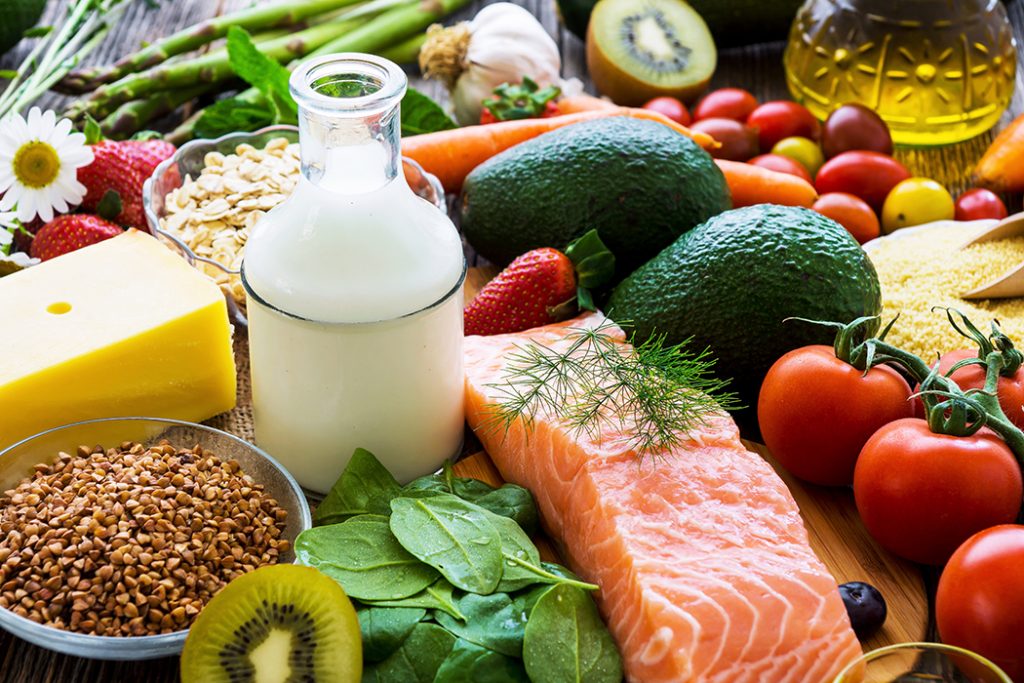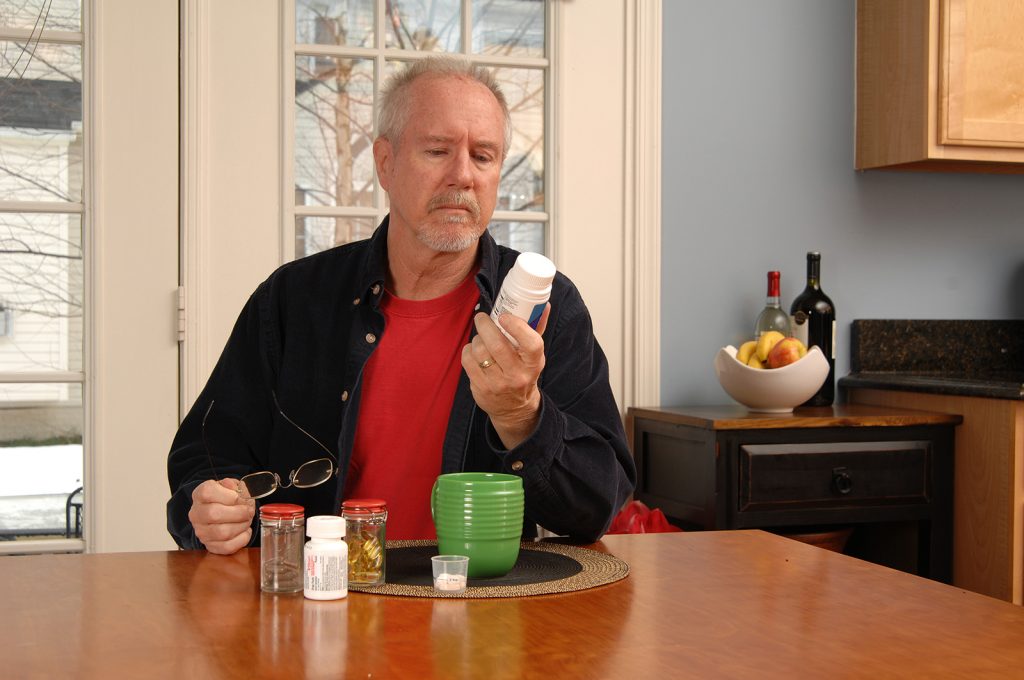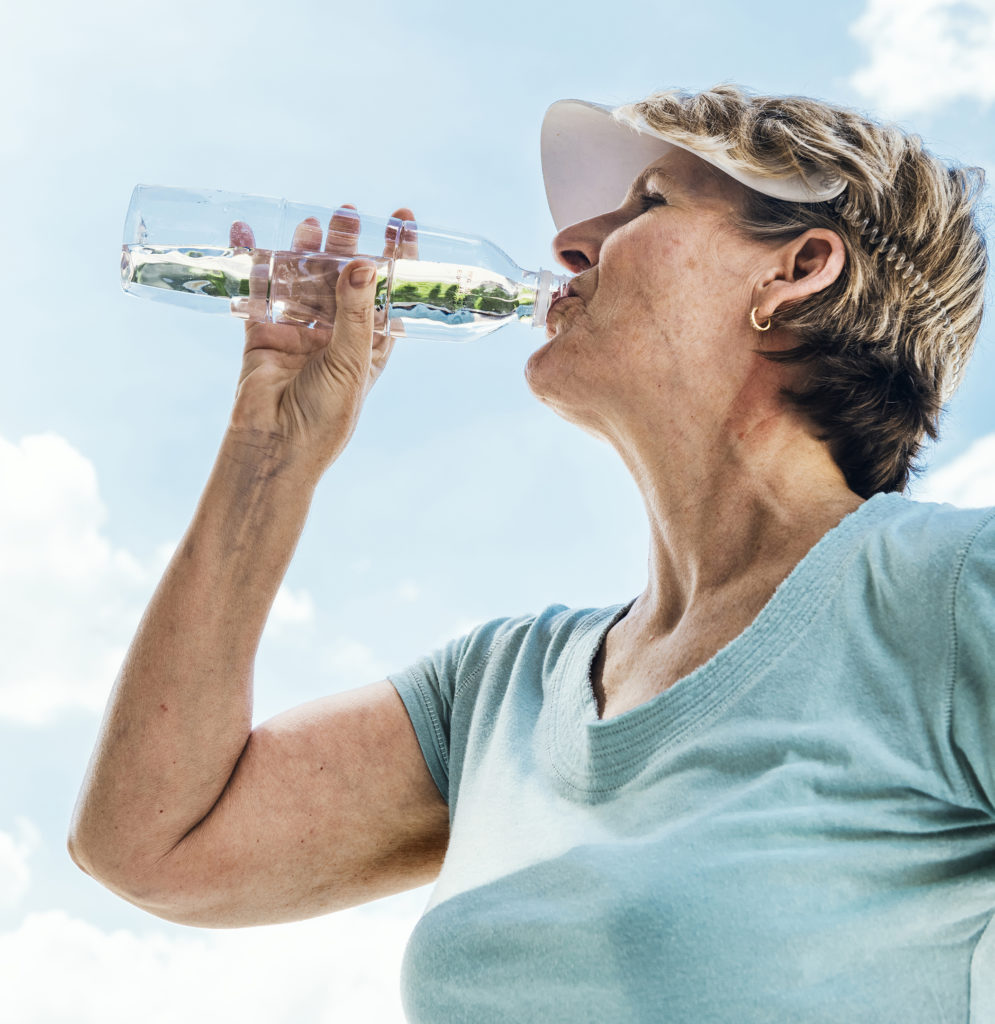Nutrition and Fluid Needs Change with Age
Eating right and staying hydrated becomes more important with age. Older adults do not burn as many calories as do younger people. People’s appetite and digestive process slows down. But that does not mean that older adults do not need a good diet. Dietary needs become more important with age. Older people need vitamins, minerals and proteins just like they did when younger. Because they need fewer calories, the choice of nutrient-rich foods is more important than ever.
Lowering Risk
Maintaining a healthy diet and staying hydrated lessens the risk of developing chronic diseases and can help ward off colds and infections.
Healthy eating is not just about avoiding high-fat, high-sugar foods. Avoiding excessive amounts of these is certainly good. But to reduce the risk of developing chronic diseases or to manage existing chronic diseases like diabetes, hypertension and heart disease, you need to eat right.
In addition, keep an eye out for any signs or symptoms of malnutrition and dehydration.
Barriers to Good Habits
Ill-fitting dentures, illness, lessening sense of taste and smell, and low activity levels decrease healthy eating. The environment is also a factor. Noisy, poorly lit dining areas, uncomfortable seating and similar stresses reduce appetite.
Don’t wait until you are thirsty to drink. By this time, you are already dehydrated. Carry a water bottle with you and keep a full water bottle in the refrigerator. Drink extra water when it’s hot out to replace the water lost from sweating.
The Building Blocks Of A Better Body
Vitamins and Supplements Necessary to Eating Right
Our body needs important nutrients to maintain proper function. This includes nutrients such at potassium, Vitamin B-12, calcium, Vitamin D, minerals and dietary fiber. When you consume foods rich in these nutrients and vitamins, you are eating right!
Calcium
Calcium builds and maintains strong bones and teeth. It also helps your blood clot and keeps the heart, muscles and nerves healthy. Young people’s bones grow rapidly, so calcium needs are greatest for the young. But with aging, your bones begin to lose calcium which can lead to osteoporosis and fractures. To avoid bone loss, people over the age of 51 should be getting 1200 milligrams of calcium daily.
Vitamin D
Vitamin D is necessary for bone health because it helps your kidneys and intestines absorb the calcium in the foods you eat. Vitamin D also keeps your skin, immune system and heart healthy. Dairy foods like milk, eggs, yogurt and cheese are good sources of calcium as is salmon, tuna, and beef liver.
But what if I’m lactose intolerant?
Lactose is a sugar found in milk and dairy products. If you are lactose intolerant you may experience stomach upset after eating or drinking dairy products. Here are some ideas:
- Take smaller portions of dairy products
- Yogurt and aged, hard cheeses like cheddar, Swiss or parmesan are easier to digest
- Try some of the new lactose-reduced products in the dairy case
- Try lactase enzyme tablets to help your body digest the lactose
Vitamin B12
As people grow old, they may become deficient in certain vitamins especially Vitamin B12. Also known as cobalamin, B12 helps make red blood cells and maintains the proper function of nerve cells. It improves brain processes, nerve function and balance. Anemia (low red blood cell count) is often a result of low B12.
Neuropathy is also the result of low B12. Symptoms include tingling, numbness, burning, poor balance and trouble walking. Unfortunately Vitamin B12 deficiency is often overlooked because many symptoms are common in other health conditions of seniors. Vitamin B12 is often given as a supplement. The recommended daily allowance for adults is 2.4 micrograms. Vitamin B12 is found in shellfish, red meats, eggs and dairy products.
Vitamin C
Vitamin C protects the immune system and increases white blood cell production which wards off cold and flu virus infections and disease. As an antioxidant, vitamin C protects white blood cells and prevents free radical damage throughout the body. Free radicals and other harmful molecules damage cells and lead to oxidative stress which hastens the aging process. Normally, seniors need 400 mg of Vitamin C daily, but if you smoke, you need an additional 35 mg of Vitamin C. Vitamin C is found in citrus fruits, strawberries, broccoli and red peppers.
Vitamin K
Vitamin K improves blood clotting. This means it works against blood thinners like Warfarin. It aids in the synthesis of proteins found in plasma, bones and kidney tissue.
Recent research has shown that Vitamin K appears to play a role in slowing calcification, the buildup of calcium in blood vessels, bone and other body tissue that happens as you age. For example, calcification in your blood vessels or heart can lead to coronary heart disease. In the cartilage of your knee, it can lead to osteoarthritis. You’ll find the most vitamin K in leafy greens like kale, spinach and broccoli. Fish, meat, liver and eggs also contain vitamin K.
Potassium
Potassium is an essential mineral and electrolyte in the body’s cells, organs and tissues. Too much or too little potassium in your diet could be damaging. Too much potassium can result in tingling, numbness and weakness. On the other hand, too little potassium can result in fatigue, muscle weakness, cramps, bone fragility, nausea, vomiting and higher blood sugar. It can also cause mood changes in older adults including confusion, depression, nervous disorders and erratic behavior.
- Foods low in potassium: apples, berries, cabbage, cauliflower, celery, chocolate, eggplant, noodles and rice
- Foods high in potassium: beans, avocados, potatoes, dark leafy greens, yogurt and bananas.
Fiber
Fiber is a complex carbohydrate that doesn’t break down when you digest it. It is found primarily in plant-based foods. There are two types of fiber: soluble and insoluble. Soluble fiber absorbs water during digestion. Insoluble fiber remains unchanged during digestion. Both kinds of fiber are important in improving digestion and avoiding constipation. Fiber also lessens cholesterol and blood sugar.
As you age, you generally tend to carry extra weight because your digestive system slows. Adding fiber and drinking more water helps keep your digestive system healthy and helps avoid weight gain. Men need 28 grams of fiber daily and women need 22 grams. Here are ways to add fiber to your diet.
- Sprinkle oat bran or wheat bran on your salad, cereal or yogurt.
- Use whole wheat flour for cooking and baking
- Read bread labels and choose one that has more fiber. Generally whole grain bread has more fiber than white bread
- Select cereals that have at least 5 grams of fiber in a serving
- Use brown rice instead of white rice, or a mixture of the two
Fiber is also found in legumes and beans and in fresh fruits and vegetables. Try adding garbanzo beans or other beans to your salads. Add more vegetables to salads too. Eat a piece of fresh fruit instead of drinking a glass of fruit juice.
Are You Hydrated?
The body is normally made up of 60% water. In the aging process, people’s bodies start losing muscle and gaining fat. Muscle holds water but fat does not, so as people age, their body water decreases.
The sense of thirst also decreases with age. Aging kidneys have a decreased ability to concentrate urine. Seniors tend to use the bathroom more frequently. As a result, seniors have about 50% body water and are at risk for dehydration.
Dehydration Symptoms
Dry, sticky mouth, dark yellow urine, muscle weakness, fatigue, irritability, headache, sleepiness or tiredness.
Avoid Dehydration
Dehydration occurs when people don’t have enough fluid in their bodies. It is a serious problem for seniors and can result in death. But it is very easy to prevent. Dehydration is one of the top ten reasons for Medicare hospitalizations. Half of all patients hospitalized with dehydration as the primary diagnosis, die within one year.
Tips for Staying Hydrated
- Don’t wait until you are thirsty to drink. By this time you are already dehydrated.
- Keep a full water bottle in the refrigerator door and take a drink every time you open the refrigerator.
- Drink extra in extreme heat to replace the water lost from sweating.
- Start and end the day with a cup of water.
- Do not replace water with alcohol or caffeinated drinks.
Medications may cause dehydration like some blood pressure and anti-depression medications. So, is it necessary to drink eight 8-ounce glasses of water daily? Maybe not because other medications retain water. Also fruits and vegetables contain fluids which keep you hydrated.
Happy Memorial Day!
This is the day to remember our brave servicemen and servicewomen who made the ultimate sacrifice for our country.










Comments are closed.